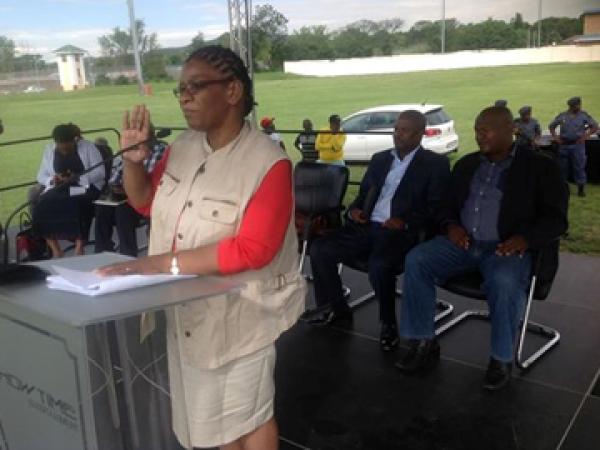How the state delivered PR instead of services to Madibeng

Public outrage followed after protestors died in January while demonstrating against problems with water service delivery in Madibeng. Until then the state’s actions in Madibeng produced PR, but failed to lead to any meaningful engagement with those directly affected by the failures of the municipality.
A 2011 report records a community protestor saying that it was “the smoke [the protests] that calls them [the state]”.
The report, titled The smoke that calls: Insurgent citizenship, collective violence and the struggle for a place in the new South Africa, put together by a team of seven researchers, looked into seven communities across the country, trying to understand what leads to collective violence.
Following the violent protests in Mothuthlung earlier this year, the North West Premier Thandi Modise along with members of the Provincial Executive Council recently hosted an Imbizo at the Brits sports ground. Community members from Mothotlung, Lethabile, Maboloka, Damonsville, Jericho, Oskraal and Oukasie were bussed in to give them an opportunity to air their grievances.
Despite the many obvious problems in the municipality, this attempt to engage took place only after the loss of lives in the community.
According to the North West Provincial Government (NWPG), the premier had “earlier appealed to communities within the municipality to support the intervention, exercise restraint and not disrupt the momentum to turn Madibeng around to be clean, effective, responsive and accountable so that it meets the basic service needs of its communities.”
Communities were yet again asked to be patient. This raises questions as to what the NWPG considers an appropriate period of time to be patient, considering that the municipality was placed under administration in 2009 and again in March 2010 after an audit exposed financial mismanagement to the tune of R100 million.
Section 139 of the Constitution allows the provincial or national government to intervene in a municipality when it is failing to deliver. In August 2012, the NWPG attempted to use Section 139 to intervene in the municipality, which prompted the then Cooperative Governance and Traditional Affairs Minister, Richard Baloyi, to appoint a task team to investigate matters.
A month later, I was in Maboloka (Brits), as a guest of the South African Human Rights Commission (SAHRC) for the North West Water and Sanitation Public Hearing. We were told of continuous water struggles and water projects costing millions of rands which had been started but never completed, without any explanation from officials.
One ward councillor, in the presence of the then municipal manager, produced photos as evidence of the allegations made at the hearing. The frustration and anger in the room was palpable, as was the breakdown of the relationship between local government officials and the communities they are meant to serve.
In 2013, despite support for the recommendations made by the ministerial task team, the municipality speaker failed to comply by not presenting the recommendations to the municipality council for approval.
Allegations were made that some people were mobilising to oppose the implementation of the recommendations This suggested there were people benefitting from the chaos at the municipality. Unions threatened strikes and marches if a council meeting was not called. Eventually, Baloyi was the one to table the report to the council when it was finally called.
Administrators and experts were deployed to the municipality as recommended by the task team. They were tasked with improving the running of the municipality. They starting by assessing a report by a previous administrator. They were to help Madibeng develop, introduce and oversee previous recommendations. The process started in June 2013 and was meant to take six months.
While the NWPG is to be commended for the interventions undertaken not only in Madibeng Municipality, but also in Ditsobotla, Maquassi and other municipalities, it has to be asked how effective these interventions have been. Beyond setting off the PR machinery of the province- what impact have they had on the lives directly affected by the problems in the municipality?
What have these interventions meant if communities feel the need to turn to collective violence to be engaged with by government? Can these interventions really be considered to be effective when five years after the 2009 intervention, communities still have to resort to smoke and barricaded roads to call the state to listen to them.
Support independent journalism
Donate using Payfast

Don't miss out on the latest news
We respect your privacy, and promise we won't spam you.

This article is licensed under a Creative Commons Attribution-NoDerivatives 4.0 International License.
